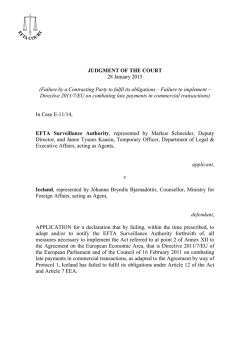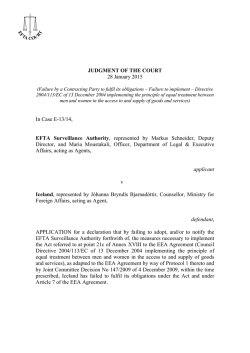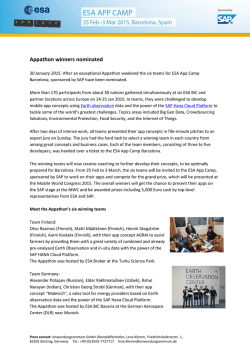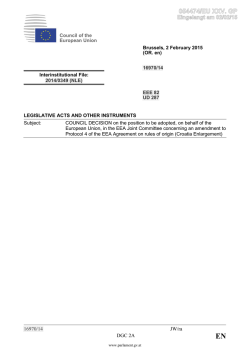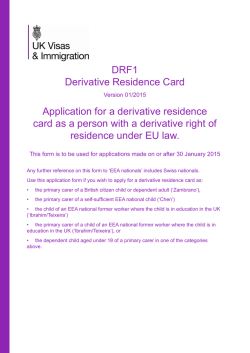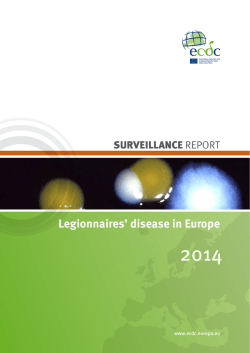
JUDGMENT OF THE COURT 28 January 2015
JUDGMENT OF THE COURT 28 January 2015 (Failure by a Contracting Party to fulfil its obligations – Directive 2009/125/EC on ecodesign requirements for energy-related products – Failure to implement) In Case E-12/14, EFTA Surveillance Authority, represented by Markus Schneider, Deputy Director, and Catherine Howdle, Temporary Officer, Department of Legal & Executive Affairs, acting as Agents, applicant, v Iceland, represented by Jóhanna Bryndís Bjarnadóttir, Counsellor, Ministry for Foreign Affairs, acting as Agent, defendant, APPLICATION for a declaration that by failing, within the time prescribed, to adopt and/or to notify the EFTA Surveillance Authority forthwith of all measures necessary to implement the Act referred to at point 6 of Chapter IV of Annex II to the Agreement on the European Economic Area (Directive 2009/125/EC of the European Parliament and of the Council of 21 October 2009 establishing a framework for the setting of ecodesign requirements for energy-related products), as adapted to the Agreement by way of Protocol 1 and by EEA Joint Committee Decision No 67/2011 of 1 July 2011, Iceland has failed to fulfil its obligations under the Act and Article 7 EEA. –2– THE COURT, composed of: Carl Baudenbacher, President, Per Christiansen (JudgeRapporteur) and Páll Hreinsson, Judges, Registrar: Gunnar Selvik, having regard to the written pleadings of the parties, having decided to dispense with the oral procedure, gives the following Judgment I 1 Introduction By an application lodged at the Court Registry on 17 July 2014, the EFTA Surveillance Authority (“ESA”) brought an action under Article 31(2) of the Agreement between the EFTA States on the Establishment of a Surveillance Authority and a Court of Justice (“SCA”), seeking a declaration that by failing, within the time prescribed, to adopt and/or to notify ESA forthwith of all measures necessary to implement the Act referred to at point 6 of Chapter IV of Annex II to the Agreement on the European Economic Area (Directive 2009/125/EC of the European Parliament and of the Council of 21 October 2009 establishing a framework for the setting of ecodesign requirements for energyrelated products) (OJ 2009 L 277 p. 38) (“the Directive”or “the Act”), as adapted to the Agreement by way of Protocol 1 thereto and by EEA Joint Committee Decision No 67/2011 of 1 July 2011, (OJ 2011 L 262, p. 21 and EEA Supplement No 54, p. 27) (“Decision 67/2011”), Iceland has failed to fulfil its obligations under the Act and Article 7 EEA. II Facts and pre-litigation procedure 2 Decision 67/2011 added the Directive to point 6 of Chapter VI of Annex II to the EEA Agreement. Iceland indicated constitutional requirements for the purposes of Article 103 EEA. In September 2012, Iceland notified that the constitutional requirements had been fulfilled. Consequently, Decision 67/2011 entered into force on 1 November 2012. The time limit for the EEA/EFTA States to adopt the measures necessary to implement the Directive expired on the same date. 3 By letter of 9 October 2012, ESA reminded Iceland of its obligation to implement the Directive into the Icelandic legal order by 1 November 2012. 4 On 6 February 2013, having received no further information from Iceland, ESA issued a letter of formal notice. ESA concluded that, by failing to adopt or, in any event, to inform ESA of the national measures it had adopted to implement the –3– Directive, Iceland had failed to fulfil its obligations under the Act and Article 7 EEA. 5 By letter of 4 April 2013, Iceland replied to the letter of formal notice, indicating that a bill had been prepared to implement the Act. 6 On 3 July 2013, ESA delivered a reasoned opinion to Iceland, maintaining the conclusion set out in its letter of formal notice. Pursuant to Article 31(2) SCA, ESA required Iceland to take the measures necessary to comply with the reasoned opinion within two months following the notification. 7 Iceland did not formally respond to that reasoned opinion. The time limit of 3 September 2013 expired without any action having been taken by Iceland. 8 During autumn 2013, Iceland informed ESA that the bill had not yet been submitted to Parliament. On 2 December 2013, Iceland stated that the bill was to be discussed on 3 December 2013, at the first reading in the Parliament. 9 On 30 January 2014, Iceland informed ESA that the relevant legislative act had been through the first reading and was under consideration before the Parliament’s Industrial Committee. On 19 March 2014, Iceland confirmed that the Committee had approved the draft law and that the bill was awaiting its second reading. 10 On 26 May 2014, Iceland informed ESA that the bill had not been adopted during the spring session of the Parliament. The adoption of the bill was to take place during the Parliament’s autumn session that year. 11 On 2 July 2014, having received no further information with respect to the implementation of the Directive, ESA decided to bring the matter before the Court pursuant to Article 31(2) SCA. III Procedure and forms of order sought 12 ESA lodged the present application at the Court Registry on 17 July 2014. Iceland submitted a statement of defence, which was registered at the Court on 30 September 2014. By letter of 17 October 2014, ESA waived its right to submit a reply and consented to dispense with the oral procedure should the Court wish to do so. By email of 20 November 2014, Iceland also consented to dispense with the oral procedure. 13 The applicant, ESA, requests the Court to: 1. Declare that by failing to adopt, and/or to notify the EFTA Surveillance Authority forthwith of, all the measures necessary to implement the Act referred to at point 6 of Chapter IV of Annex II to the Agreement on the European Economic Area (Directive 2009/125/EC of the European Parliament and of the Council of 21 October 2009 establishing a framework for the setting of ecodesign –4– requirements for energy-related products), as adapted to the Agreement by way of Protocol 1 thereto, within the time prescribed, Iceland has failed to fulfil its obligations under the Act and under Article 7 of the EEA Agreement. 2. Order Iceland to bear the costs of these proceedings. 14 The defendant, Iceland, submits that the facts of the case as set out in the application are correct and undisputed. Iceland neither disputes the declaration nor the order sought by ESA. 15 After having received the express consent of the parties, the Court, acting on a report from the Judge-Rapporteur, decided pursuant to Article 41(2) of the Rules of Procedure (“RoP”) to dispense with the oral procedure. IV Findings of the Court 16 Article 3 EEA imposes upon the Contracting Parties the general obligation to take all appropriate measures, whether general or particular, to ensure fulfilment of the obligations arising out of the EEA Agreement (see, inter alia, Case E-8/14 ESA v Iceland, not yet reported, paragraph 17, and the case law cited). 17 Under Article 7 EEA, the Contracting Parties are obliged to implement into their legal order all acts referred to in the Annexes to the EEA Agreement, as amended by decisions of the EEA Joint Committee. An obligation to implement the Directive, and to notify ESA, also follows from Article 23 of the Directive. The Court points out that the lack of direct legal effect in Iceland of acts referred to in decisions from the EEA Joint Committee, makes timely implementation crucial for the proper functioning also in Iceland of the EEA Agreement. The EEA/EFTA States find themselves under an obligation of result in that regard. 18 Decision 67/2011 entered into force on 1 November 2012. The time limit for the EEA/EFTA States to adopt the measures necessary to implement the Directive expired on the same date. 19 The question whether an EEA/EFTA State has failed to fulfil its obligations must be determined by reference to the situation in that State as it stood at the end of the period laid down in the reasoned opinion (see, inter alia, ESA v Iceland, cited above, paragraph 19, and case law cited). It is undisputed that Iceland did not adopt measures necessary to implement the Directive before the expiry of the time limit given in the reasoned opinion. 20 Since Iceland did not implement the Directive within the time prescribed, there is no need to examine the alternative form of order sought against Iceland for failing to notify ESA of the measures implementing the Directive. 21 It must therefore be held that Iceland has failed to fulfil its obligations under the Act referred to at point 6 of Chapter IV of Annex II to the Agreement on the –5– European Economic Area (Directive 2009/125/EC of the European Parliament and of the Council of 21 October 2009 establishing a framework for the setting of ecodesign requirements for energy-related products), as adapted to the Agreement by way of Protocol 1 and by EEA Joint Committee Decision No 67/2011 of 1 July 2011, and under Article 7 of the Agreement, by failing to adopt the measures necessary to implement the Act within the time prescribed. V 22 Costs Under Article 66(2) RoP, the unsuccessful party is to be ordered to pay the costs if they have been applied for in the successful party’s pleadings. Since ESA has requested that Iceland be ordered to pay the costs, and the latter has been unsuccessful, and none of the exceptions in Article 66(3) apply, Iceland must therefore be ordered to pay the costs. –6– On those grounds, THE COURT hereby: 1. Declares that Iceland has failed to fulfil its obligations under the Act referred to at point 6 of Chapter IV of Annex II to the Agreement on the European Economic Area (Directive 2009/125/EC of the European Parliament and of the Council of 21 October 2009 establishing a framework for the setting of ecodesign requirements for energy-related products), as adapted to the Agreement by way of Protocol 1 and by EEA Joint Committee Decision No 67/2011 of 1 July 2011, and under Article 7 of the Agreement, by failing to adopt the measures necessary to implement the Act within the time prescribed. 2. Orders Iceland to bear the costs of the proceedings. Carl Baudenbacher Per Christiansen Páll Hreinsson Delivered in open court in Luxembourg on 28 January 2015. Gunnar Selvik Registrar Carl Baudenbacher President
© Copyright 2026
